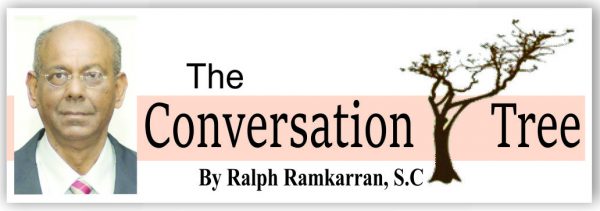 Guyana has achieved the dubious distinction of taking the longest time to announce election results and of having the largest number of court cases concerning elections between the commencement of the voting and the declaration. Impatience is in the air, reflected by former Business Minister, Dominic Gaskin, who called on his former colleagues to “find a way out today.” He said that “there is not a shred of evidence” that the APNU+AFC coalition won the elections.
Guyana has achieved the dubious distinction of taking the longest time to announce election results and of having the largest number of court cases concerning elections between the commencement of the voting and the declaration. Impatience is in the air, reflected by former Business Minister, Dominic Gaskin, who called on his former colleagues to “find a way out today.” He said that “there is not a shred of evidence” that the APNU+AFC coalition won the elections.
Perhaps Mr. Gaskin would not have had the opportunity of seeing Mr. Vincent Alexander’s letter beforehand, in which he alleged that GECOM had death certificates of 61 persons who had voted. There was some bafflement at Mr. Alexander’s connection of the 61 dead voters with the absence of evidence of weapons of mass destruction in Iraq, against which country war was declared and thousands died. The logic of the analogy suggests that there are no ballots of mass destruction in Guyana but the West is making war on Guyana. Notwithstanding what appears to be a logical conclusion from the statement, it appears that Mr. Alexander is suggesting that 61 ballots of mass destruction could mean that there are 61,000 and the West is therefore wrong to impose sanctions.
If the Caricom election observers were not informed of the 61, whose fault was that? And if they were, what would have been the consequence? The acknowledged principle in determining the veracity of election results generally, as well as judicially, is determined by the following answer to the question: Are the acts of fraud likely to have affected the results? If the answer is no, then the alleged fraud is not considered to be material. Mr. Keith Lowenfield, the Chief Election Officer, who assumes the sole right to determine the election results, condemned in no uncertain terms by the CCJ, has proposed several different reports with different election results for consideration by GECOM. Having failed to discard 115,000 votes from the number of persons who voted, he now seeks to calculate the results on the basis of the reports of the returning officers, including Clairmont Mingo, the discredited Returning Officer for Region 4. It is clear that his strategy is that he tries one result, it doesn’t work, he tries another.
President Granger, having repeatedly undertaken to abide by a declaration by GECOM, has recently qualified that statement by adding a proviso that the declaration must be lawful. The President did not say who will be the arbiter of what is lawful, but he has declared that the last results submitted by Lowenfield are the lawful results. At the present time, with the rejection by APNU+AFC supporters, of the results of the CCJ’s decision in Ali and Jagdeo v David, or at least their misreading of it, it is the Chief Election Officer, Mr. Lowenfield who has assumed that role by insisting that he has the right to determine what are the lawful results of the elections. He is at odds with the Chair, who has instructed him to submit results on the recount, which he has steadfastly refused to do.
President Granger accused the PPP of filing three court cases and thereby delaying the results, ignoring his own coalition’s dominant role in the delay. In fact, the PPP filed one case, by Reeaz Holladar, and one follow up case. The Holladar case successfully challenged Mingo’s fraudulent counting procedures of the Region 4 ballots and the second case sought to imprison him for contempt for refusing to obey the Judge’s order. It is the APNU+AFC which has inspired the filing of three cases, the first by Ulita Moore, the second by Eslyn David and the third by Misenga Jones. In the first two cases, the Court ruled against the applicants and in the third case, the decision is due on Monday. On each occasion these cases were filed, GECOM’s proceedings came to a halt, delaying its progress towards a declaration.
The filing of the case by Ms. Jones, after two previous cases failed, was the last straw for the international community. It creates further delay and seeks to achieve power for Lowenfield to declare results other than the recount results. This was the tipping point.
If APNU+AFC intends to continue thumbing its nose at the international community, and refusing to declare the election results based on the recount, the sanctions imposed on APNU+AFC and election officials will extend to their families, then their enablers, then will extend to economic sanctions, direct and indirect, against APNU+AFC and election officials, their families and the country as a whole. International cooperation, including funding for projects, access to resources and loans will dry up. Guyana’s relations with the OAS, the Commonwealth and Caricom, will be adversely affected. Oil resources will become inaccessible. This is the future that awaits Guyana and its people.









